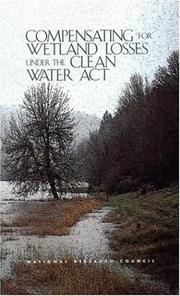| Listing 1 - 4 of 4 |
Sort by
|

ISBN: 1597269018 1417539836 9781417539833 1559633719 1559633719 Year: 1996 Publisher: Washington, D.C. Island Press
Abstract | Keywords | Export | Availability | Bookmark
 Loading...
Loading...Choose an application
- Reference Manager
- EndNote
- RefWorks (Direct export to RefWorks)
Wetland conservation. --- Wetland mitigation banking. --- Banking, Wetland mitigation --- Mitigation banking, Wetland --- Wetland banking --- Wetlands mitigation banking --- WMB (Wetland mitigation banking) --- Wetlands --- Conservation of wetlands --- Wetlands conservation --- Nature conservation --- Economic aspects --- Conservation

ISBN: 0309074320 030950290X 9780309502900 9780309074322 0305074320 0309133025 Year: 2001 Publisher: Washington, D.C. National Academy Press
Abstract | Keywords | Export | Availability | Bookmark
 Loading...
Loading...Choose an application
- Reference Manager
- EndNote
- RefWorks (Direct export to RefWorks)
Wetland conservation -- Government policy -- United States. --- Wetland mitigation banking -- United States. --- Wetlands -- Law and legislation -- United States. --- Wetlands --- Wetland conservation --- Wetland mitigation banking --- Law - U.S. --- Law, Politics & Government --- Public Property Laws - U.S. --- Law and legislation --- Government policy --- Banking, Wetland mitigation --- Mitigation banking, Wetland --- Wetland banking --- Wetlands mitigation banking --- WMB (Wetland mitigation banking) --- Conservation of wetlands --- Wetlands conservation --- Conservation --- Nature conservation --- Economic aspects
Book
ISBN: 0262359073 9780262359078 9780262539197 0262539195 0262359065 Year: 2020 Publisher: Cambridge, Massachusetts : The MIT Press
Abstract | Keywords | Export | Availability | Bookmark
 Loading...
Loading...Choose an application
- Reference Manager
- EndNote
- RefWorks (Direct export to RefWorks)
"One of the most influential, and perhaps surprising,developments in environmental policy in recent decades is the idea that we can protect the environment from the negative impacts of economic development by making environmental protection itself more economic. The goal is to reduce environmental harm not by preventing it, but by pricing it. Using stream mitigation banking, that is the market for rivers and streams under Section 404 of the US Clean Water Act, as a case, Lave and Doyle explain where market-based environmental management approaches came from, how they work in practice, and what they do on ground"--
Wetland mitigation banking --- Environmental policy --- Ecosystem services --- Stream restoration --- Restoration ecology --- Economic aspects --- United States. --- Ecological restoration --- Ecosystem restoration --- Rehabilitation ecology --- Restoration of ecosystems --- Applied ecology --- Rehabilitation, River --- Rehabilitation, Stream --- Restoration of rivers --- Restoration of streams --- River rehabilitation --- River restoration --- Stream rehabilitation --- Rivers --- Services, Ecosystem --- Ecology --- Banking, Wetland mitigation --- Mitigation banking, Wetland --- Wetland banking --- Wetlands mitigation banking --- WMB (Wetland mitigation banking) --- Wetlands --- Restoration --- Regulation --- ENVIRONMENT/General
Book
ISBN: 1597268151 1610910257 1597268143 Year: 2011 Publisher: Washington, DC : Island Press/Center for Resource Economics : Imprint: Island Press,
Abstract | Keywords | Export | Availability | Bookmark
 Loading...
Loading...Choose an application
- Reference Manager
- EndNote
- RefWorks (Direct export to RefWorks)
Lawyers, Swamps, and Money is an accessible, engaging guide to the complex set of laws governing America's wetlands. After explaining the importance of these critical natural areas, the book examines the evolution of federal law, principally the Clean Water Act, designed to protect them. Readers will first learn the basics of administrative law: how agencies receive and exercise their authority, how they actually make laws, and how stakeholders can influence their behavior through the Executive Branch, Congress, the courts, and the media. These core concepts provide a base of knowledge for successive discussions of: the geographic scope and activities covered by the Clean Water Act the curious relationship between the U.S. Army Corps of Engineers and the Environmental Protection Agency the goal of no net loss of wetlands the role of entrepreneurial wetland mitigation banking the tension between wetland mitigation bankers and in-lieu fee mitigation programs wetland regulation and private property rights. The book concludes with insightful policy recommendations to make wetlands law less ambiguous and more effective. A prominent legal scholar and wetlands expert, professor Royal C. Gardner has a rare knack for describing landmark cases and key statutes with uncommon clarity and even humor. Students of environmental law and policy and natural resource professionals will gain the thorough understanding of administrative law needed to navigate wetlands policy-and they may even enjoy it.
Business & Economics --- Earth & Environmental Sciences --- Law, Politics & Government --- Economic History --- Law, General & Comparative --- Environmental Sciences --- Wetlands --- Wetland conservation --- Wetland mitigation banking --- Law and legislation --- Banking, Wetland mitigation --- Mitigation banking, Wetland --- Wetland banking --- Wetlands mitigation banking --- WMB (Wetland mitigation banking) --- Conservation of wetlands --- Wetlands conservation --- Conservation --- Environment. --- Ecosystems. --- Aquatic ecology. --- Climate change. --- Environmental law. --- Environmental policy. --- Marine sciences. --- Freshwater. --- Environmental Law/Policy/Ecojustice. --- Marine & Freshwater Sciences. --- Freshwater & Marine Ecology. --- Climate Change. --- Nature conservation --- Economic aspects --- Marine Sciences. --- Aquatic biology. --- Endangered ecosystems. --- Climatic changes. --- Changes, Climatic --- Changes in climate --- Climate change --- Climate change science --- Climate changes --- Climate variations --- Climatic change --- Climatic changes --- Climatic fluctuations --- Climatic variations --- Global climate changes --- Global climatic changes --- Climatology --- Climate change mitigation --- Teleconnections (Climatology) --- Threatened ecosystems --- Biotic communities --- Hydrobiology --- Water biology --- Aquatic sciences --- Biology --- Ocean sciences --- Environment law --- Environmental control --- Environmental protection --- Environmental quality --- Environmental policy --- Law --- Sustainable development --- Environmental aspects --- Aquatic ecology . --- Biocenoses --- Biocoenoses --- Biogeoecology --- Biological communities --- Biomes --- Biotic community ecology --- Communities, Biotic --- Community ecology, Biotic --- Ecological communities --- Ecosystems --- Natural communities --- Ecology --- Population biology --- Aquatic biology --- Fresh waters --- Freshwater --- Freshwaters --- Inland water --- Inland waters --- Water --- Environment and state --- Environmental management --- State and environment --- Environmental auditing --- Government policy --- Global environmental change
| Listing 1 - 4 of 4 |
Sort by
|

 Search
Search Feedback
Feedback About UniCat
About UniCat  Help
Help News
News